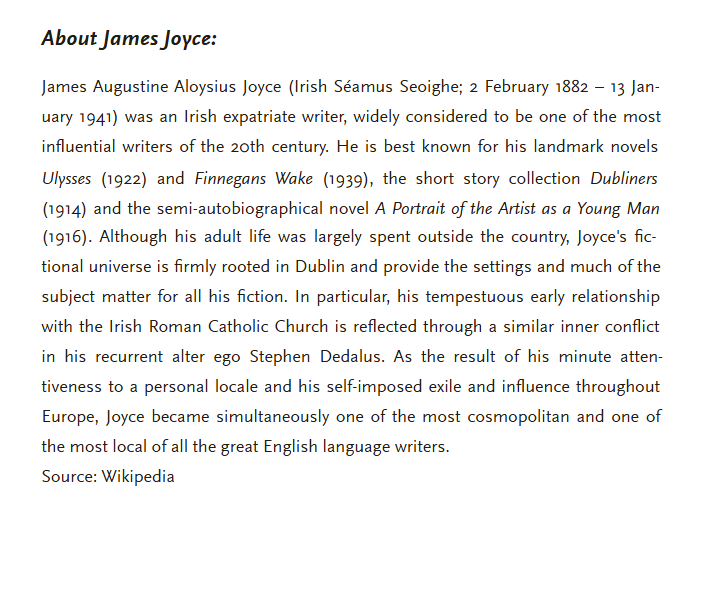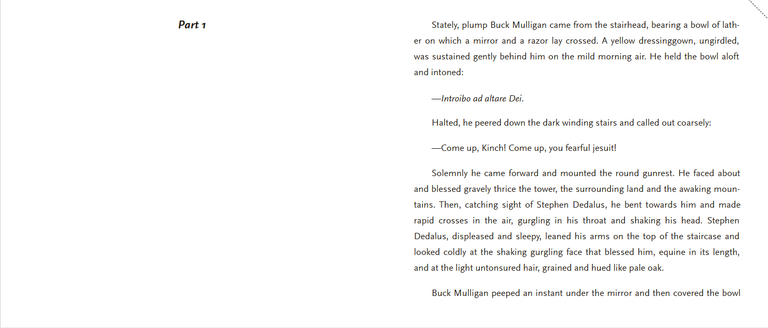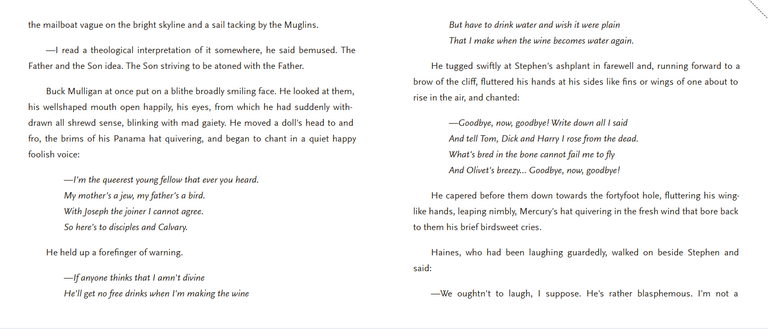Hello to all members of Hive Book Club! This is my first long overdue post. I've been wanting to read this book for far too long and attempting to write a book review had been unimaginably tough. Reading differs tremendously from putting thoughts into writing well. Nevertheless and better late than never, here it goes. James Joyce’s “Ulysses” stands as a monument in the realm of literature, renowned for its innovative narrative techniques and profound exploration of everyday life. This modernist work, published in 1922, redefined the boundaries of the novel, challenging conventions and offering a rich, multifaceted experience that continues to captivate readers. To appreciate the true uniqueness of "Ulysses," one must consider its groundbreaking structure, its intricate characterizations, and the depth of its thematic explorations. These elements not only contribute to its status as a literary classic but also reflect the broader socio-cultural dynamics of Joyce's time.

One of the most significant aspects of "Ulysses" is its structure, which mirrors the epic form of Homer’s "Odyssey." However, Joyce subverts traditional narrative frameworks by presenting a day in the life of ordinary Dubliners—Leopold Bloom, Stephen Dedalus, and Molly Bloom. Throughout this single day, Joyce employs a variety of narrative styles and techniques, including stream-of-consciousness, interior monologue, and deep psychological insight. Each chapter presents different styles, reflecting the diverse experiences and perspectives of the characters. The use of stream-of-consciousness, in particular, allows readers to delve deeply into the thoughts and feelings of the characters, blurring the lines between narration and thought.

Joyce's unique structural approach elevates mundane experiences to the level of epic significance. For instance, Bloom’s simple act of making breakfast transforms into a grand exploration of identity, sexuality, and existence. Such contrasts are a hallmark of Joyce’s approach, challenging readers to view ordinary life through a new lens. By grounding his narrative in the everyday activities of his characters, Joyce suggests that there is beauty and complexity in the mundane—a radical shift from the grand narratives that dominated literature before him.

Additionally, the rich characterization in "Ulysses" contributes significantly to its distinctive nature. Each character is meticulously crafted, with their internal struggles and societal roles intricately woven into the narrative fabric. Leopold Bloom, the everyman, represents the marginalized, the outsider within his own society, navigating a predominantly Irish culture that is steeped in traditionalism. His Jewish heritage sets him apart, making him a symbol of the broader themes of alienation and belonging in an increasingly modern world.

In contrast, Stephen Dedalus embodies the restless spirit of youth, grappling with artistic ambition and intellectualism while simultaneously feeling the weight of familial and cultural expectations. His journey throughout the novel mirrors Bloom's, culminating in a relationship that transcends generations and ideologies. The interactions between Bloom and Stephen highlight an essential theme of mentorship and connection, illustrating how relationships can bridge divides and foster understanding in a fragmented society.
Molly Bloom, perhaps the most enigmatic character, serves as a counterpoint to both Bloom and Stephen. Her internal monologue in the final chapter of the book offers a radical exploration of female sexuality and desire at a time when such themes were often suppressed. Through Molly, Joyce challenges the patriarchal norms of his time, presenting a woman who is both sensual and assertive. The famous concluding lines of her soliloquy, with its repetitive affirmation of love, encapsulate the complexities of human emotion, underscoring the novel's overarching theme of interconnectedness.
Beyond its structure and characterization, "Ulysses" is unique in its thematic explorations. At its core, the novel grapples with issues of identity, belonging, and the search for meaning in a rapidly changing world. The socio-political landscape of early 20th-century Ireland serves as a backdrop to the characters' personal struggles, reflecting the tensions between tradition and modernity, nationalism and individualism. Joyce deftly weaves historical events and cultural critiques into the narrative, inviting readers to reconsider their relationship with history and the forces that shape their identities.
Furthermore, Joyce’s use of humor and irony adds another layer of complexity to the text. The absurdity of certain situations, coupled with incisive social commentary, invites readers to engage critically with the story. For example, Bloom’s experiences on his odyssey through Dublin often highlight the absurdities of social conventions and cultural expectations. This blend of humor and seriousness allows Joyce to address weighty topics without losing accessibility, a balance that many modernist writers struggled to achieve.
Critics have praised "Ulysses" not only for its literary innovation but also for its influence on subsequent generations of writers. The novel’s experimental nature paved the way for later modernist and postmodernist works, encouraging authors to push the boundaries of narrative form and explore subjective realities. Joyce’s impact is evident in the works of writers such as Virginia Woolf, Franz Kafka, and William Faulkner, all of whom embraced similar techniques to convey the intricacies of human experience.
While "Ulysses" may initially appear daunting due to its length and complexity, its richness rewards patient readers. The novel demands active engagement, prompting readers to explore themes of identity and existence while immersing themselves in the vivid landscape of Dublin. Each reading unveils new layers of meaning, reinforcing its status as a timeless work that resonates with contemporary audiences.
In conclusion, James Joyce’s "Ulysses" is undeniably unique in its structure, characterization, and thematic depth. It challenges conventional storytelling and offers a profound exploration of the human condition, rendering the ordinary extraordinary. As readers navigate the intricacies of Bloom’s and Stephen’s lives, they are invited to reflect on their own experiences of identity, connection, and the search for meaning. The brilliance of Joyce lies not only in his innovative narrative techniques but also in his ability to capture the complexities of life, making "Ulysses" a lasting masterpiece in the canon of world literature. In celebrating the uniqueness of this work, many acknowledge it as a cornerstone of modern literature, one that continues to inspire and provoke thought across generations.
Thank you so much for reading! 💗
What a truly monumental book, had it in my bookcase for many years since I was 14, and every year I would read a few pages just to find myself not understanding much. I was finally able to read it when I reached 25, guess some books are waaaay more demanding than others.
Thank you for your kind comments. Yes, I truly agree with you that Ulysses is indeed a very rewarding yet demanding book.